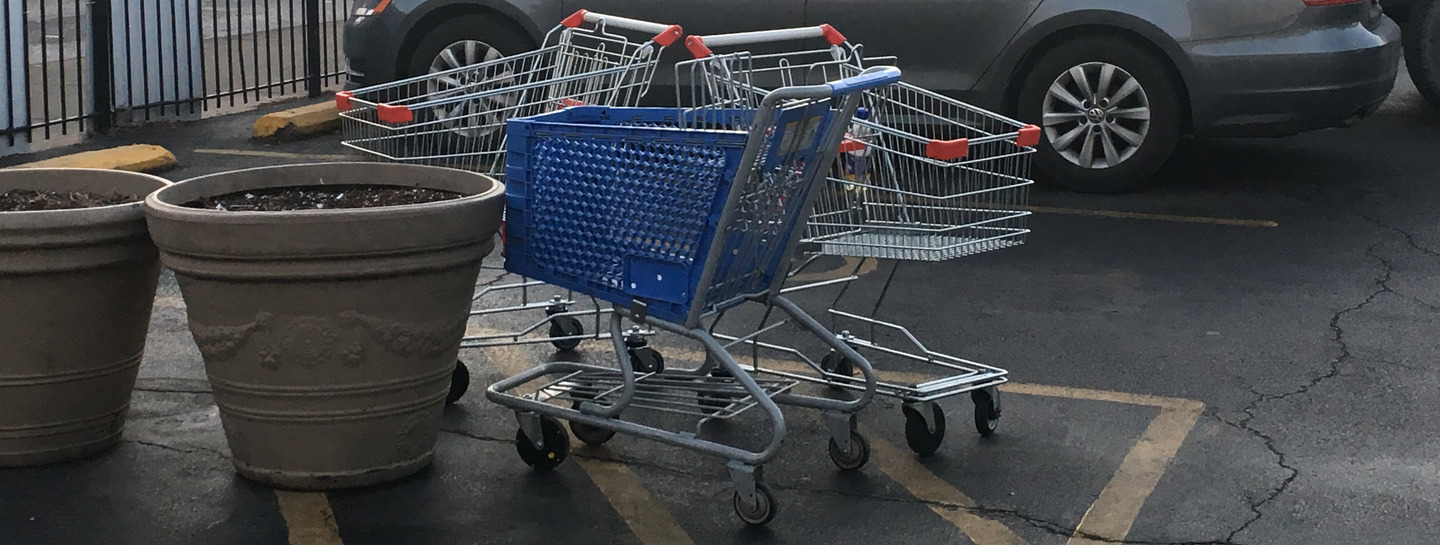Lingering outside stores, gathering conspiratorially in loading zones, abandoned on the far sides of parking lots or on sidewalks or in downtown pedestrian zones, half-concealed behind hedges: the common shopping cart became an unexpected emblem of Chicago’s shelter in place order as the COVID-19 pandemic swept into U.S. consciousness. It is the sign of stock-piling and food hoarding, of food insecurity and fear. The further it gets from the grocery store parking lot, the more uncanny it becomes. Because a cart is only at home in the lot and the store, it brings the lot and the store with it: and with the lot and the store, it also brings the car, and with car the distance between home and what it takes to live there. And with that distance, other distances—between farms and processing plants, plants and shipping centers, shipping centers and population centers, population centers and peripheries. And with these distances, the fuel to cross them, and with that fuel, the markets and industries that extract, process, and sell it, and with those markets and industries, the uneven threads that support life—and tie the net of the pandemic. The shopping cart is the part of global capitalism that many of us grip in our hands, that we push forward to survive, and that, at least sometimes, we steer.
Others have, can, and will write more useful things than I can about the historical, systemic injustices—particularly racism against native and black Americans—that unevenly distribute shopping carts and the necessity for them, and that unevenly distribute the necessity to own cars, and the means for them. But just as these disparities are visible in the uneven maps of COVID-19 infection rates and fatalities, in a smaller way, they are visible in the movements of the shopping cart, which has rolled onto the stage of injustice with clarity and urgency as protests sparked by George Floyd’s death have been sweeping the U.S. and the world. As peaceful gatherings are disrupted by looting and violent riots, neat nested rows of carts scatter anarchically through the lots of Jewel-Oscos and Targets, filling with and emptying looted goods; and then, as officers attempt to protect shopping centers, the same carts roll to the entrances and barricade the doors. Goods and groceries in, people out. The carts contain the seemingly infinite gap between the having and the not having, and their forced, violated, and then forced emptiness describes the need for food, water, and financial security and for legal and societal equality.
If the cart doesn’t care whether it’s empty or full, we have to. And if the cart doesn’t care whether it, and the car, and the lot, and the gas, and the oil market, are necessary or not—we should. The pandemic reshuffled (upended) our urgent priorities, but even while the health (and governance) crisis is at the forefront, I don’t want to lose track of the ongoing ecological crisis, not because they are unrelated, but precisely because they are linked. As global and domestic supply chains have ground to a halt and products have sold out too fast or ceased to be made, the shopping cart figures the interdependence between our health and our environment, and shows just how dispersed that environment is. (How many different places were your vegetables grown in, and how far did your pasta, grains, meats travel to reach you? How many ingredients in your processed foods do you know how to pronounce—and the others? where and how were they manufactured?) My question is, how can we prevent the dual necessity and inability to hoard food, perhaps not only due to a pandemic, but to ecological collapse? How can we feed ourselves and others from sources closer to home—sources that are sustainable? How can we become fossil-fuel independent and slow the devastating effects of global warming? How can we restore vital resources to the hands and management of those whose vital resources have been systematically depleted and robbed for generations?
For my part, academia—by which, as a mid-career graduate student, I mean the time constraints of coursework and summer institutes abroad during growing season—has so far nipped my impulse to garden in the bud. But the shopping cart reminds me of this vast and tangled network of food, climate, and (in)justice, and its increased visibility at the start of Chicago’s shelter-in-place orders has prompted me to look around, online, and donate the money I probably would have spent on food anyways (busy days, working nights mean lunches, dinners out). Here are just a few of the many local and global organizations active in Chicago: The Urban Canopy; My Block, My Hood, My City; Citizen’s Climate Lobby and 350.org; The Recyclery and Working Bikes. Focusing on local and sustainable food and education, on grassroots activism and climate-oriented governance, and on empowerment, community, and fossil-free transportation, these organizations are working towards the kind of world that offers me hope for a more livable future—a future in which we loosen our hold on the shopping cart, and loosen its hold on us.


